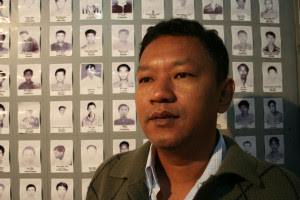A report by a political prisoner advocacy group has condemned the government’s ongoing arrest of political opponents.
The Association Assisting Political Prisoners (AAPP) point out that Burma’s President, U Thein Sein has failed to deliver on his promise to the international community to release all political prisoners by the end of 2013.

“Regardless of the government statements that no more political prisoners remain in Burma’s prison, AAPP is continually monitoring the ongoing arrests of political activists and is continuing to try and advocate for their release.” AAPP said in their latest report released in February this year.
President U Thein Sein made a commitment to free all prisoners of conscience by the end of 2013. In a London visit to meet with British Prime Minister David Cameron, President Thein Sein said, “I guarantee to you that by the end of this year, there will be no prisoners of conscience in Myanmar…We are aiming for nothing less than a transition from half a century of military rule and authoritarianism to democracy.”
AAPP claim that Article 18 of the Peaceful Assembly and Peaceful Procession Law is being used to imprison political opponents of Burma’s regime.
The laws requires protests to receive permission from authorities before it can proceed. In the past protestors who have received multiple official rebuttals have gone ahead with protests ‘illegally’, exposing them to a 30,000 Kyat fine and one year jail sentence.
“The controversial section 18 of the Peaceful Assembly and Peaceful Procession Law continues restricting the rights to freedom of expression and peaceful assembly, leaving peaceful protesters at high risk of imprisonment and allowing authorities to arbitrarily prohibit demonstrations,” AAPP said.
Bo Kyi, Joint-Secretary of the AAPP (Burma) said that lack of progress in amending or replacing draconian protest laws, like Article 18, highlighted the Burmese Government’s hostility towards dissenting political voices.
“Ongoing arrests shows that President Thein Sein has not kept his promise to release all political prisoners by 2013. I think this is because of a lack of political will. There are around 170 activists including farmers and journalists awaiting sentencing,” Bo Kyi said in an interview with Karen News.
“The issue of political prisoners is not yet solved. The government are still using oppressive laws to restrict freedom of expression, freedom of movement and freedom of assembly. There is a lack of rule of law, and arbitrary detention and torture are ongoing in Burma,” Bo Kyi added.
Ko Bo Kyi noted that farmers who protested against land confiscation was a growing issue as Burma opened up to international development projects requiring large tracts of land.
“Another big issue is the arrest of farmers who are opposing land confiscation – they are being given 3 to 6 months imprisonment under criminal charges such as 447 and 427.”
AAPP’s state that its aim is to free all political prisoners in Burma and improve prison conditions are worried that the government is labeling political prisoners as ‘criminals’ to avoid scrutiny.
“One of our biggest concerns is that we cannot confirm the government’s assertion that the remaining 30 prisoners that we think are political, are criminals. In fact, we can’t investigate any prison in Burma to verify what the government says. Even though we made requests to visit these individuals our requests have been denied. We have requested on several occasions to visit these individuals, each time our request has been rejected.”
Bo Kyi maintained that the current political prisoners were mainly from ethnic armed groups and included former Burma Army soldiers who had leaked confidential military information to the international community.
“The government has said that those 30 individuals are criminals or controversial cases, not political prisoners, but they are members of ethic armed forces and we consider them as political prisoners. Most of them are from the KNU, KIA, SSA or former Burma Army who leaked information about the government’s nuclear program and relationship with North Korea. Some of these individuals have been in prison since around 2006,” he said.
Since the start of this year 12 new activists have been jailed, with a further 30 activists who remained in prison after being arrested in 2013. This included the arrest and imprisonment of five members of the 88 Generation pro-democracy activist group who have been sentenced to between three and six months under Article 18, AAPP noted.
Moreover, a further four activists were charged under Article 18 last week after holding public discussions on environmental conservation, as reported in regional media.


